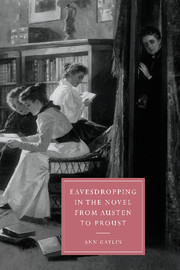Book contents
- Frontmatter
- Contents
- Acknowledgments
- Introduction
- 1 I'm all ears: Pride and Prejudice, or the story behind the story
- 2 Eavesdropping and the gentle art of Persuasion
- 3 Household words: Balzac's and Dickens's domestic spaces
- 4 The madwoman outside the attic: eavesdropping and narrative agency in The Woman in White
- 5 La double entente: eavesdropping and identity in A la recherche du temps perdu
- Conclusion: covert listeners and secret agents
- Notes
- Select bibliography
- Index
1 - I'm all ears: Pride and Prejudice, or the story behind the story
Published online by Cambridge University Press: 22 September 2009
- Frontmatter
- Contents
- Acknowledgments
- Introduction
- 1 I'm all ears: Pride and Prejudice, or the story behind the story
- 2 Eavesdropping and the gentle art of Persuasion
- 3 Household words: Balzac's and Dickens's domestic spaces
- 4 The madwoman outside the attic: eavesdropping and narrative agency in The Woman in White
- 5 La double entente: eavesdropping and identity in A la recherche du temps perdu
- Conclusion: covert listeners and secret agents
- Notes
- Select bibliography
- Index
Summary
La double entente déborde largement le cas limité du jeu de mots ou de l'équivoque et imprègne au fond, sous des formes et des densités diverses, toute l'écriture classique … Le lecteur est complice, non de tel ou tel personnage, mais du discours lui-même en ce qu'il joue la division de l'écoute, l'impureté de la communication.
Barthes, S/ZWords learn'd by rote a parrot may rehearse,
But talking is not always to converse.
Cowper, “Conversation”Almost everyone who has read Emily Brontë's Wuthering Heights or seen William Wyler's 1939 film version remembers the dramatic scene in which Catherine, unaware of Heathcliff's presence on the other side of the kitchen wall, confides her feelings for him to Nelly. Heathcliff stays only long enough to overhear Catherine say, “it would degrade me to marry Heathcliff now.” Thus, he never learns of Catherine's love for him, and her complete identification with him (“he's more myself than I am … Nelly, I am Heathcliff”). This eavesdropping scene is crucial to the very existence of the narrative, a story based primarily on the miscommunication between and resulting separation of the two central characters. If Heathcliff had not overheard this conversation, or if he had stayed to hear it in its entirety, Wuthering Heights as we know it would not exist; the story set in motion by this partial acquisition of information (or misinformation) would not unfold because there would be nothing to tell.
- Type
- Chapter
- Information
- Eavesdropping in the Novel from Austen to Proust , pp. 26 - 41Publisher: Cambridge University PressPrint publication year: 2003

